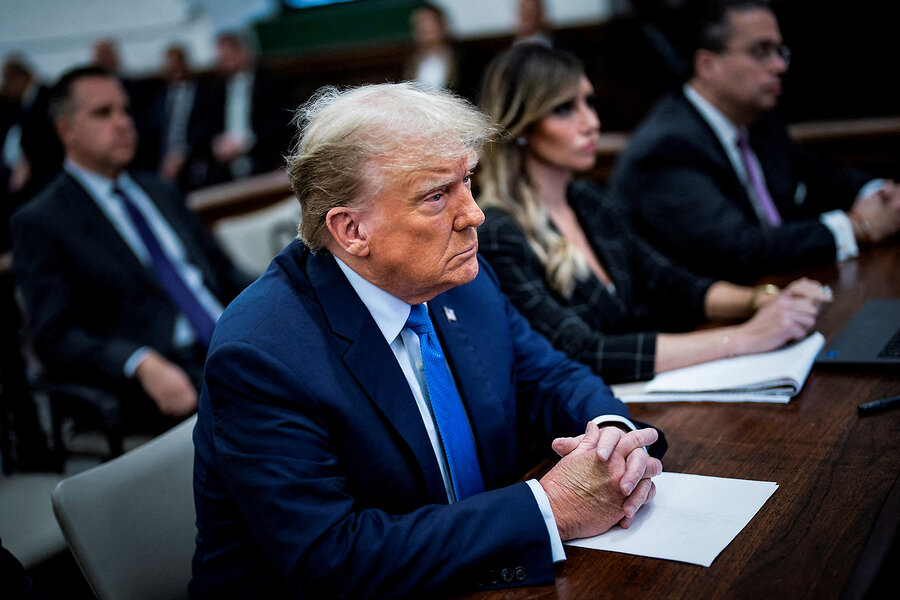Trump’s criminal trials recede – but not civil fraud penalty
Loading...
It’s perhaps the best of times and the worst of times for former President Donald Trump and his legal strategies.
Recent weeks have been good for Mr. Trump, in that attempts to delay his criminal trials have had some success. His federal election interference case is on hold while the Supreme Court weighs his claim that presidents are immune from such prosecution. His Florida classified documents case has unfolded slowly since charges were filed last June. His Georgia state election trial hasn’t been scheduled, as prosecutor Fani Willis faced questions over her relationship with a subordinate.
On Friday, the last criminal case that was proceeding on schedule derailed, as Mr. Trump’s New York hush money trial was delayed at least a month. The culprit was a last-minute evidence dump from federal prosecutors who had previously looked at charging the former president.
Why We Wrote This
Months ago, it looked like criminal lawsuits would feature prominently in Donald Trump’s 2024 calendar. Instead, key cases have been delayed, while a civil fraud verdict weighs heavily on the presidential candidate.
But in civil cases, Mr. Trump has lately faced legal setbacks and embarrassment involving a core aspect of his identity: his wealth.
That became clear on Monday when Mr. Trump’s lawyers said he was unable to secure a multimillion-dollar bond to cover the judgment against him in his New York state civil fraud case.
In a court filing, Trump attorneys said they had been turned down by 30 companies in their efforts to secure a bond they estimated would have to be at least $454 million. Obtaining financial backing of that magnitude “is not possible under the circumstances presented,” the filing said.
“Trump has been incredibly lucky with regard to his criminal trials, but his civil trials in New York could get him in a lot of trouble, with him needing to liquidate many of his assets,” says Daniel Urman, a professor of law and public policy at Northeastern University, in an email response to questions.
Tactics of delay
Delay has been a central pillar of Mr. Trump’s defense against his criminal prosecutions. The closer trials are to November, the greater the chance judges might postpone them to avoid the appearance of influencing the 2024 presidential vote. If Mr. Trump again wins the presidency, he might order that the federal cases brought by special counsel Jack Smith be dropped by the Justice Department, or even pardon himself to avoid trial.
As matters stand, the only criminal case that seemed sure to wrap up prior to the election was the New York hush money case, which involves the money paid to porn actress Stormy Daniels to keep quiet about her allegations of an affair with Mr. Trump. Now even that is up in the air following last week’s postponement.
But his civil trials – which typically result only in monetary judgments, not jail time – currently threaten to cost Mr. Trump unexpectedly large amounts of cash.
Writer E. Jean Carroll’s sexual assault and defamation suits against Mr. Trump have so far resulted in a stinging $88.3 million judgment. This figure could be reduced on appeal. It might also go up. Mr. Trump has continued to publicly deny the charges and insult Ms. Carroll, which he had been warned by the judge not to do, leaving him open to further legal proceedings.
The New York state civil fraud case, in which Judge Arthur Engoron ruled that Mr. Trump, his sons, and business associates illegally inflated the value of properties to obtain better terms on loans, added hundreds of millions of dollars more in penalties.
If the former president wants to stay the judgment while he appeals, he has to post with the court either the cash owed, or a bond to cover the amount plus interest, estimated at $454 million. If he does not, New York Attorney General Letitia James may begin seizing Trump assets to make sure the penalty gets paid.
Will $100 million bond be enough?
The deadline is March 25. Mr. Trump has offered a bond of $100 million. The court may accept that, or delay proceedings.
“There’s some reasons for the court to give him a stay pending appeal without posting a full bond. We’ll see whether they do that or not,” says Gregory Germain, director of the bankruptcy clinic at Syracuse University College of Law.
But the former president’s difficulties in obtaining a bond suggest that he is less wealthy than he has publicly proclaimed, or that large financial institutions are wary of lending him money.
“He’s not a good credit risk, I think, in a lot of ways,” says Professor Germain.
Like many real estate investors, Mr. Trump has much of his money tied up in buildings or land. But financial institutions won’t accept such Trump assets as collateral for a bond, his lawyers wrote on Monday. They want either cash or other assets more readily converted to cash, such as securities.
Mr. Trump’s lawyers also argued that he should not be forced to divest himself of buildings in order to raise money for the bond.
Obtaining cash “through a ‘fire sale’ of real estate holdings would inevitably result in massive, irrecoverable losses – textbook irreparable injury,” they wrote.






